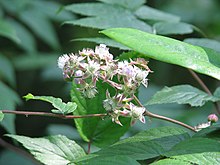Rubus cockburnianus
| Rubus cockburnianus | |
|---|---|

| |
| Scientific classification | |
| Kingdom: | Plantae |
| Clade: | Tracheophytes |
| Clade: | Angiosperms |
| Clade: | Eudicots |
| Clade: | Rosids |
| Order: | Rosales |
| Family: | Rosaceae |
| Genus: | Rubus |
| Species: | R. cockburnianus
|
| Binomial name | |
| Rubus cockburnianus | |
| Synonyms | |
|
Rubus giraldianus | |
Rubus cockburnianus, the white-stemmed bramble, is a species of flowering plant in the family Rosaceae. It is endemic to China.[1][2] It was named by the botanist William Hemsley to honour the Cockburn family.[3]
This bramble is a shrub growing up to 3 meters tall. The smaller branches are brown or reddish, hairless, waxy, and armed sparsely with prickles. The leaves are divided into several serrated leaflets which are hairless or slightly hairy on the upper surfaces and woolly-haired underneath. Inflorescences occur in the axils and at the ends of branches. The pink flowers are about one centimeter wide and have many stamens in their centers. The purple-black aggregate fruit is under a centimeter long.[2]
The native habitat of the plant includes forests, thickets, and riverbanks.[2]
In cultivation it is valued for its vivid white winter branches. It can be used as a security barrier, quickly becoming an impenetrable thicket.[4] Cultivars for garden use include 'Goldenvale'. It has yellow foliage, white branchlets, purple flowers, and black fruits.[5] It has gained the Royal Horticultural Society’s Award of Garden Merit.[6][7]
References[edit]
- ^ "Rubus cockburnianus". Germplasm Resources Information Network. Agricultural Research Service, United States Department of Agriculture. Retrieved 21 January 2018.
- ^ a b c Rubus cockburnianus. Flora of China.
- ^ The Naming of the Shrew. London: Bloomsbury. 2014. p. 55. ISBN 978-1-4088-6555-2.
- ^ RHS A-Z Encyclopedia of Garden Plants. United Kingdom: Dorling Kindersley. 2008. p. 1136. ISBN 978-1405332965.
- ^ Rubus cockburnianus 'Goldenvale'. BBC Plant Finder.
- ^ "RHS Plantfinder - Rubus cockburnianus 'Goldenvale'". Retrieved 10 October 2018.
- ^ "AGM Plants - Ornamental" (PDF). Royal Horticultural Society. July 2017. p. 85. Retrieved 10 October 2018.
